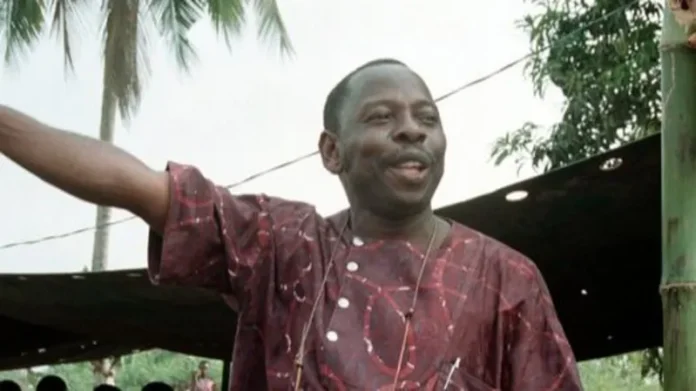Thirty years ago, the execution of activist Ken Saro-Wiwa sent shockwaves across the globe, sparking outrage and cementing his name as a symbol of environmental justice. Now, in a move that aims to right a historical wrong, Nigeria’s President Bola Tinubu has pardoned the late activist and eight other campaigners, known as the Ogoni Nine. This powerful gesture, coinciding with Nigeria’s annual Democracy Day on Thursday, also saw national honors bestowed upon these “heroes” who, as Tinubu noted, made “outstanding contributions” to the nation’s democracy.
The nine men – Ken Saro-Wiwa, Barinem Kiobel, John Kpuinen, Baribor Bera, Felix Nuate, Paul Levula, Saturday Dobee, Nordu Eawo, and Daniel Gbokoo – were among dozens celebrated during the national awards ceremony. Their names, once synonymous with a dark chapter in Nigeria’s history, are now officially cleared by the state.
A Legacy Forged in Oil and Outrage
To truly understand the weight of this pardon, we must look back at the events of 1995. Ken Saro-Wiwa, a brilliant author and fierce environmental advocate, became a leading voice for the Ogoni people. He spearheaded peaceful demonstrations against the operations of major oil multinationals, particularly Shell, in Nigeria’s resource-rich Ogoniland. The core of his message and the movement he led, the Movement for the Survival of the Ogoni People (MOSOP), was a stark accusation: these companies were heavily polluting the land that the local communities relied on for their very livelihoods.
The military regime in power at the time responded with a brutal crackdown on the protesters. In a move that shocked the world, Ken Saro-Wiwa and the other eight Ogoni activists were subsequently convicted of the murder of four Ogoni chiefs by a secret military tribunal. Their execution by hanging in November 1995 was met with thunderous condemnation from the international community. Many believed they were being punished not for murder, but for their tireless activism against powerful oil interests. The executions were widely labeled as “extrajudicial murder” and quickly became a global symbol of the struggle against environmental injustice and state repression. In response, Nigeria was suspended from the Commonwealth group of nations, facing severe diplomatic isolation. Shell, for its part, has consistently denied any involvement in the executions.
Pardon or Exoneration? The Fight for True Justice Continues
While President Tinubu’s pardon has been broadly welcomed as a positive step, it hasn’t satisfied everyone. Some activists and even relatives of the Ogoni Nine argue that it simply “does not go far enough.”
MOSOP, the organization Saro-Wiwa once led, called the pardon a “courageous act.” However, they also voiced a crucial distinction: a pardon implies wrongdoing, suggesting that the men were guilty but forgiven. In reality, MOSOP insists, “no crime ever took place.” This sentiment was echoed heartbreakingly by Barinem Kiobel’s widow, who, while grateful for the national honor bestowed on her husband, publicly appealed to the president to “properly declare [her] husband and his compatriots innocent,” underscoring that “a pardon is not granted to the innocent.”
Similarly, global human rights watchdog Amnesty International stated that clemency (which a pardon is) “falls far short of the justice the Ogoni Nine need.” They argued that more fundamental steps are required, especially concerning holding oil companies accountable.
The Ongoing Battle: Environmental Accountability and Shell
Amnesty International’s call for greater accountability from oil companies for environmental damage in Nigeria points to a broader, ongoing struggle that extends beyond the 1995 executions. The Niger Delta, of which Ogoniland is a part, has endured decades of devastating oil spills and environmental degradation.
Shell, in particular, has faced numerous lawsuits regarding oil pollution in the region. In a landmark ruling in 2021, a Dutch court ordered Shell to compensate Nigerian farmers for spills that had contaminated vast areas of farmland and fishing waters. The company later agreed to pay over a hundred million dollars in settlement.
More recently, just earlier this year, lawyers representing two Ogoniland communities presented their case in London’s High Court, arguing that Shell must take responsibility for oil pollution that occurred between 1989 and 2020. Shell, however, maintains its stance, denying wrongdoing and asserting that most spills in the region are caused by sabotage, theft, and illegal refining, for which the company says it is not liable. The full trial for this significant case is scheduled for 2026.
A Complex Legacy, An Unfinished Fight
President Tinubu’s pardon of Ken Saro-Wiwa and the Ogoni Nine is undoubtedly a powerful symbolic gesture, acknowledging a profound injustice in Nigeria’s past. It marks a step towards healing and recognizing the immense sacrifice these individuals made for their people and their environment.
However, as the responses from affected families and human rights groups highlight, a pardon, while significant, doesn’t fully equate to an exoneration of innocence in the eyes of many. The larger battle for environmental justice, for holding powerful corporations accountable for ecological damage, and for truly addressing the historical scars in places like Ogoniland, continues to unfold. The legacy of Ken Saro-Wiwa remains a potent reminder that the fight for justice, both historical and environmental, is far from over.


